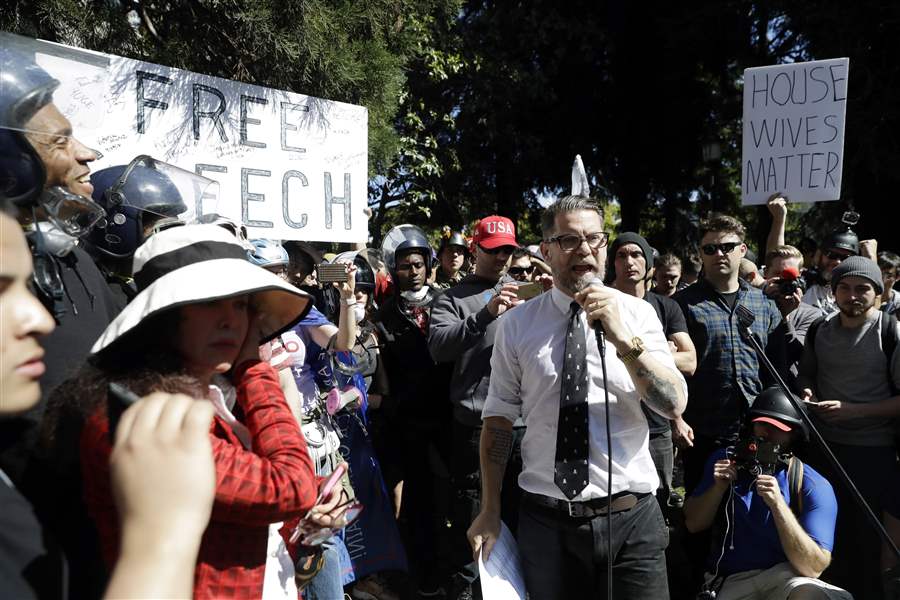
FREE SPEECH FOR THEE?
Higher education continues to fail on free speech issues
12/22/2017
Far-right commentator and co-founder of VICE Gavin McInnes speaks at a rally for free speech near the University of California, Berkeley, on April 27.
ASSOCIATED PRESS
In a year marked by numerous free speech battles, college campuses continue to play a central role in the war over First Amendment values. According to a recent survey, however, more than 90 percent of the country’s universities “still maintain at least one policy that either restricts protected speech or can too easily be interpreted to do so.”
The Foundation for Individual Rights in Education (FIRE), a nonpartisan national organization that promotes civil liberties on college campuses, recently published its “Spotlight on Speech Codes 2018” report, which examined the relevant policies of 461 American colleges and universities.
Read FIRE’s “Spotlight on Speech Codes 2017” report
The organization found that 32.3 percent of surveyed institutions currently maintain “speech codes that both clearly and substantially restrict freedom of speech.” What’s more, the majority of universities surveyed — 58.6 percent — have policies that “prohibit or have an impermissible chilling effect on constitutionally protected speech.”
There is at least one positive aspect to the report. According to FIRE, this is the 10th year in a row in which campus speech codes have decreased.
Yet, it is hard to be optimistic about the state of free speech at our colleges and universities, when so many institutions of higher education — both public and private — have shown a disregard for free expression on their campuses.
Ohio State, a school which has received a “yellow light” from FIRE (placing them within the aforementioned 58.6 percent of colleges with restrictive policies), recently prohibited students from hanging posters or signs in their windows. Nothing appears to have instigated Ohio State’s ban other than fear that students might place something offensive in their windows. Now everything from a racist slogan to the American flag has been prohibited from the windows of OSU students.
The weight of the campus speech issue is more obviously felt when you consider that FIRE was able to examine less than ten percent of the colleges and universities in the U.S. for its report. (There are approximately 5,300 institutions of higher learning in the U.S.)
RELATED: Colleges must adapt to solve the free speech crisis
One of the schools not included in the report would be Beloit College, my alma mater. Earlier this year FIRE questioned aspects of Beloit’s “bias incident policy,” which targets “verbal, written, or physical” acts of “intolerance or prejudice that does not involve violence or other conduct violating college policy.” Representatives of FIRE stated that the policy would likely chill speech on campus and allowed Beloit to “investigate speech that would be protected under First Amendment standards.”
In spite of this, the policy is still in place at Beloit and there are signs that some members of the college community hope to expand the speech restrictions. A professor recently told The Round Table, Beloit’s student newspaper, that no speakers should be allowed on campus without being first approved by a group of “socially conscious” college members.
Beloit’s continued embrace of speech chilling policies is evidence of the limits of FIRE’s reach. The organization can highlight the problems and advocate action, but its influence is limited. As a result, a growing number of legislators have shown an interest in involving themselves in the campus speech debate.
Beloit is a private school and, consequently, has greater latitude in many areas, including its speech policies. Public colleges, however, receive public funding and are subject to legislative oversight and action. A number of states, including Ohio, have either proposed or passed bills that mandate public colleges create free speech policies. On Capitol Hill, federal lawmakers are considering alterations to the Higher Education Act that would promote free speech on campuses.
FIRE has praised these actions, but a number of educators have shown concern, expressing the fear that such bills will diminish the autonomy of colleges and universities.
“As a matter of general principles we don’t think these legislative remedies are the way to go,” Hank Reichman, a history professor at California State University-East Bay and the chairman of the American Association of University Professors’ committee on academic freedom and tenure, told U.S. News & World Report.
“We can certainly conceive of ones that would not be harmful,” he said, “but by and large it should be in the purview of the university and college communities to ensure that people have the right to speak, including to protest against other speakers.”
Read last week’s ‘Free Speech For Thee?’ column
Would it be better for colleges and universities to support free speech and counter efforts to suppress free speech voluntarily and without the interference of legislative bodies? As a person who believes the role of government should be limited, I am inclined to say yes.
But the results of FIRE’s 2018 report, coupled with news reports from across the country, suggest that many of the institutions traditionally viewed as bastions of free expression and inquiry instead place sharp limits on who may speak and what they are allowed to say. Which means that whether we like it or not, whether we want it or not, it is likely that in 2018 laws will be enacted that force colleges and universities to support FIrst Amendment rights on an explicit basis.
The praise of FIRE and other groups notwithstanding, there is no joy in the realization that most of our colleges and universities, though they claim to support academic freedom, have been unable to set aside political biases in favor of full support of free speech and may not be willing to do so without the coercive interference of government.
Contact Will Tomer at wtomer@theblade.com, 419-724-6404, or on Twitter @WillTomer.